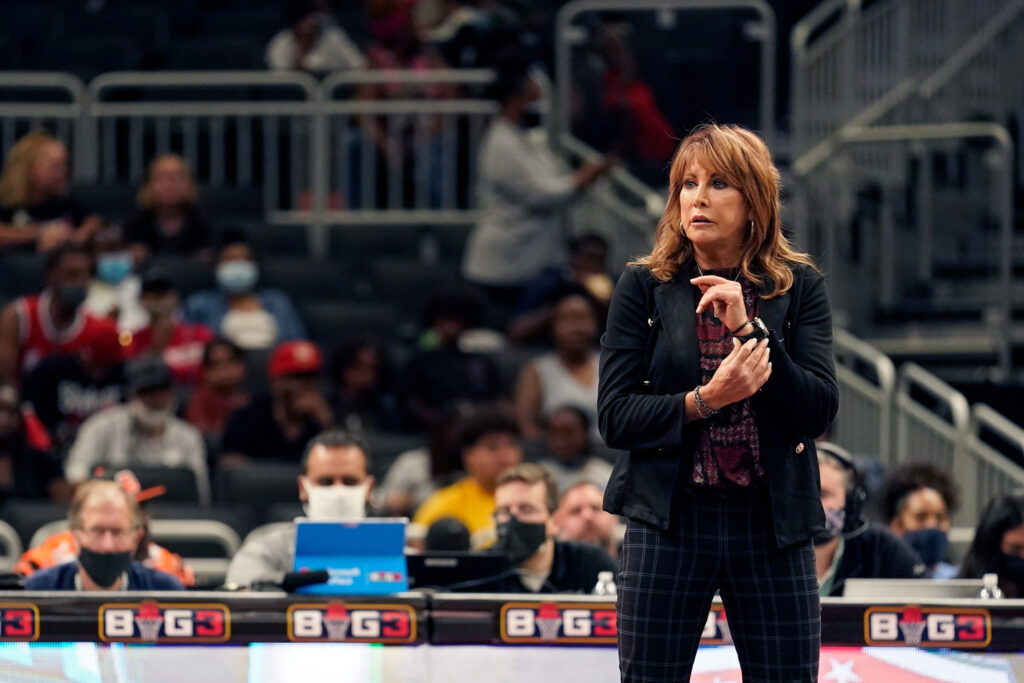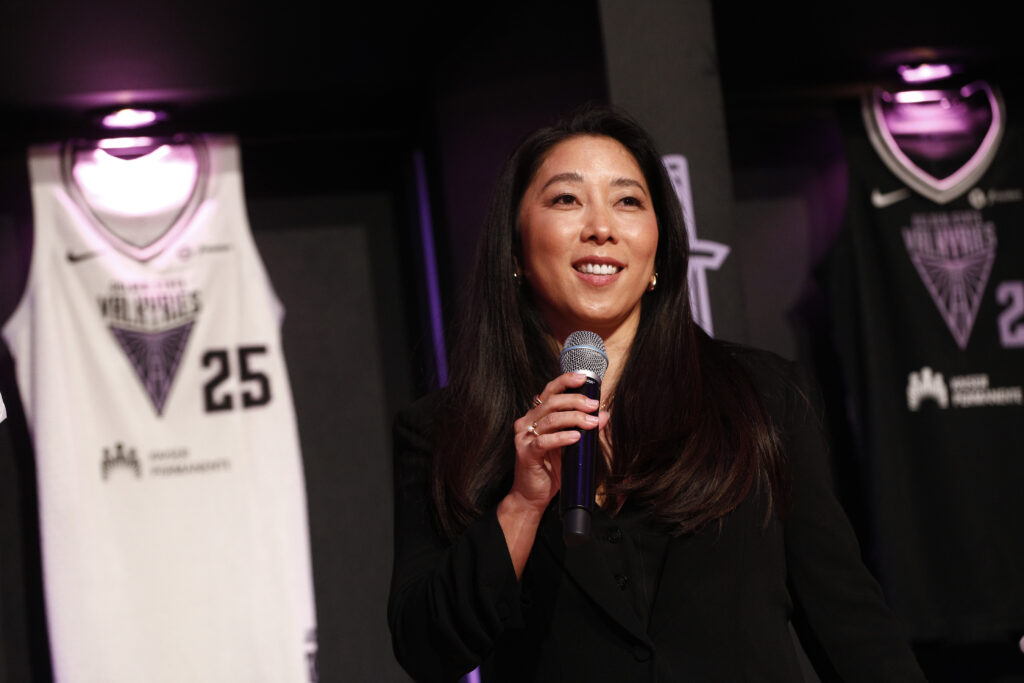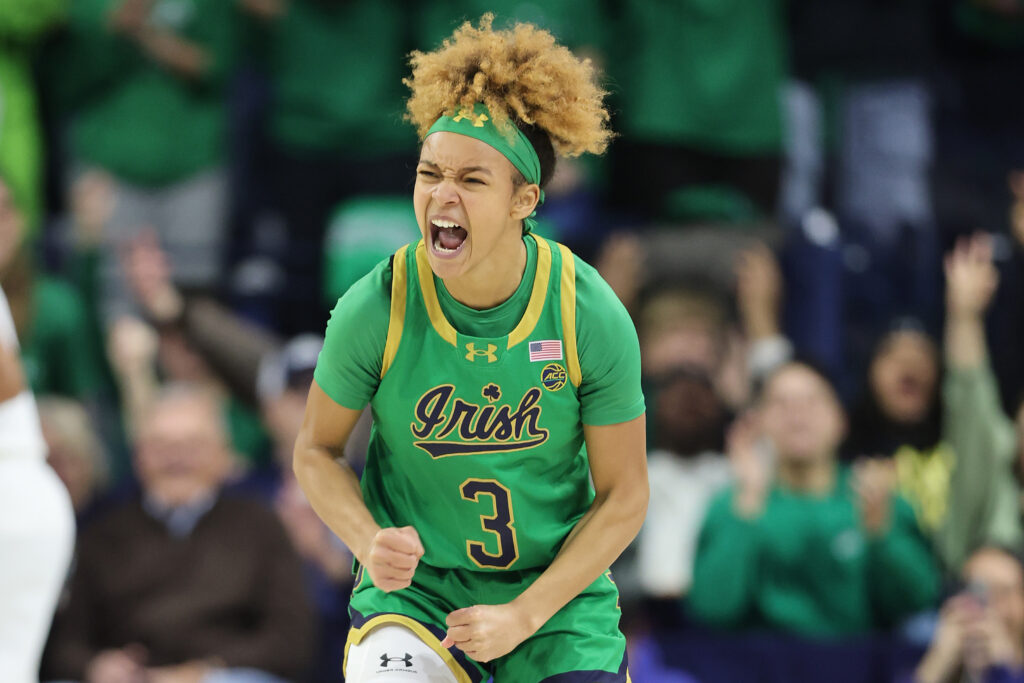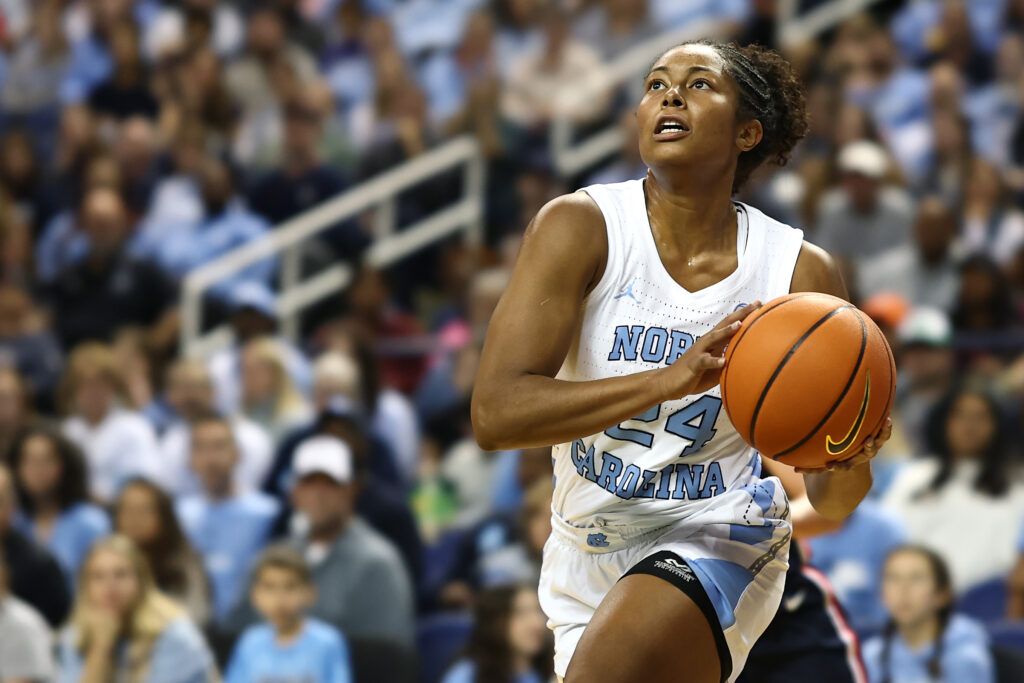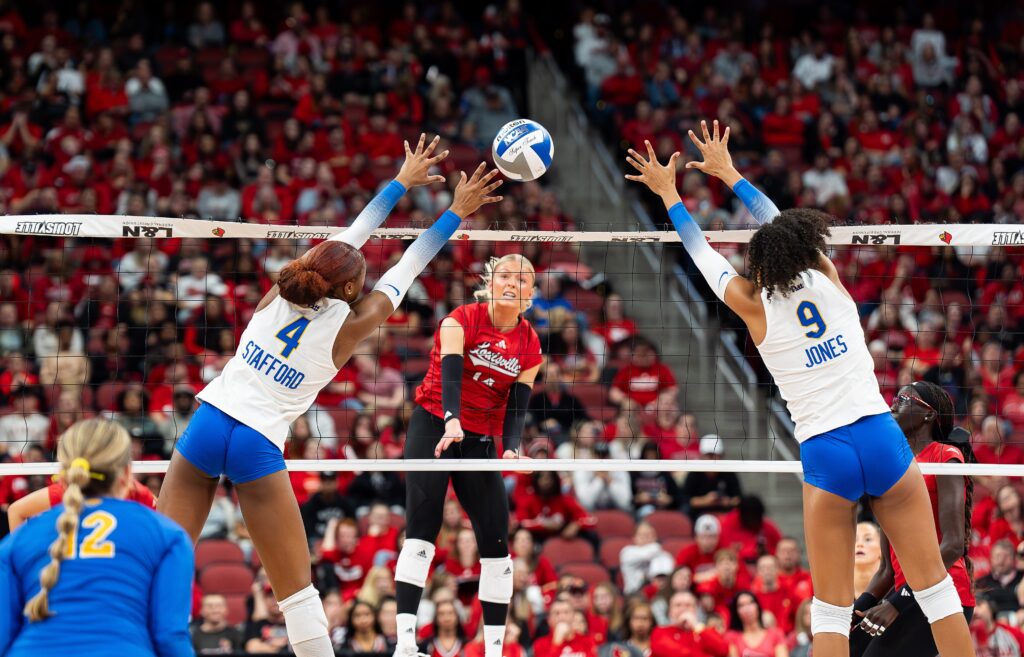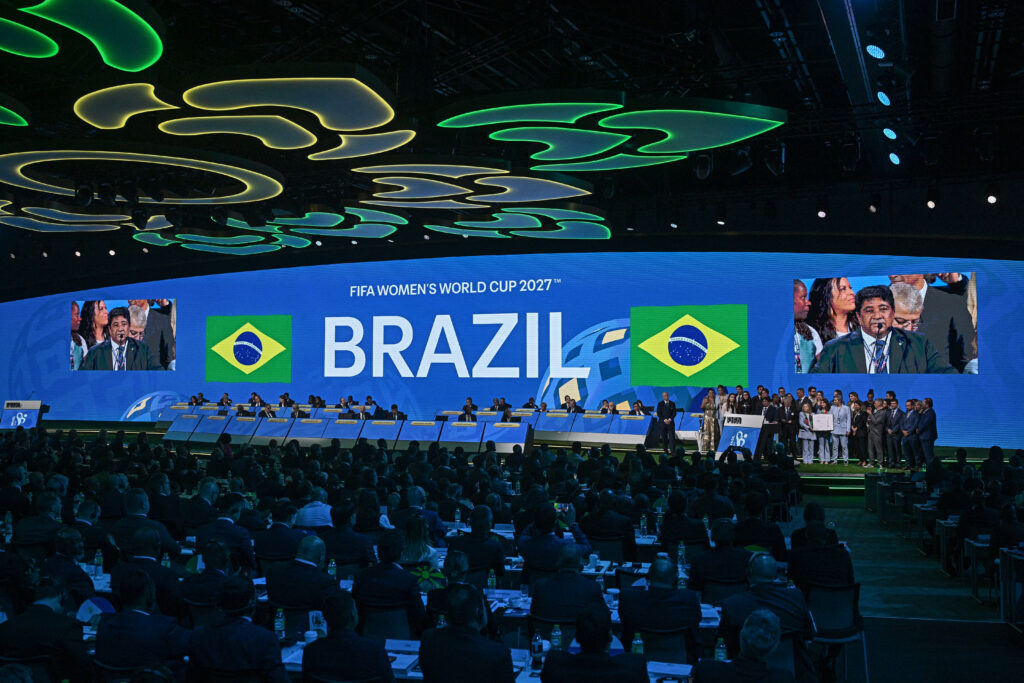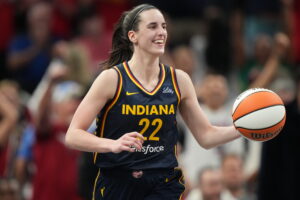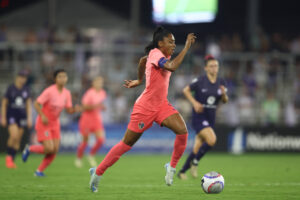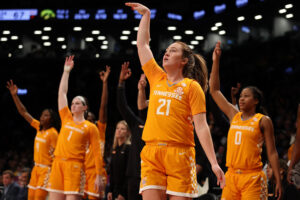For basketball legend Nancy Lieberman, the future of women’s sports will always be tied to the past.
While the 63-year-old trailblazer is in no way preoccupied with what once was, she appreciates the value of history and giving those who came before their due.
“Legends of the game, players who played the game, they don’t want anything, they just want a little shine, they want a little love, they want a little respect,” Lieberman tells Just Women’s Sports.
If anyone deserves “a little shine,” it’s Lieberman, who led Old Dominion to two consecutive AIAW National Championships in 1979 and 1980, was the first draft pick of the Women’s Pro Basketball League and joined the WNBA for its inaugural 1997 season at 39 years old.
As a coach, Lieberman led the WNBA’s Detroit Shock for three seasons starting in 1998 and became the second female assistant coach in NBA history when she joined the Sacramento Kings’ staff in 2015. She now coaches in the BIG3, a three-on-three basketball league founded by actor and musician Ice Cube.
Lieberman’s message for current athletes is that one day they, too, will be considered pioneers of the game. Before then, she says, they should champion women’s equality and progress and embrace their place in history.
“While you’re going up, just make sure you’re high-fiving, hugging, fist-bumping people that set the plate up for you because you’re going to be that person,” she says. “That’s why we fought for so long on the hill with Title IX, with gender equity. Everything that you see today, the fight has been real for this generation and beyond.”
The New York native wants basketball fans, in particular, to understand the history of the women’s game in order to fully appreciate where the league is today and where it’s headed.
“Do your research because you’re going to miss a lot of the greatness,” Lieberman says. “Women’s basketball did not start in 1997 with the WNBA; it did not start in 1982 with the NCAA. Women’s basketball had a healthy past.”

Lieberman’s reverence for history and dedication to advancement is what makes her partnership with CollectibleXchange by Brandon Steiner so seamless. The online collectible marketplace, launched in August, connects sellers directly to consumers with a wide-ranging inventory of women’s sports memorabilia.
Lieberman sees the collaboration with longtime friend Steiner as an opportunity to highlight women’s sports. The collectibles, she says, reinforce the athletes’ value and help amplify women whose greatness has long been overlooked.
“A lot of people in the ’80s, ’90s, 2000s, were an afterthought,” Lieberman says.
As a decorated former athlete and a friend to many sports legends, Lieberman has quite the assortment of memorabilia herself. Her collection consists of an Olympic torch, her Olympic medals, Tiger Woods autographed golf balls, Diana Taurasi sneakers and Michael Jordan signed jerseys.
“I am still a fan no matter who people think I am throughout the course of my career,” Lieberman says. “I am a fan of greatness.”
No two people stand out more to Lieberman when it comes to greatness than tennis star Martina Navratilova and boxer Muhammad Ali. She calls both athletes her heroes for pushing sport and society forward, accomplishments she believes put them in a category of their own.
“To be a GOAT (greatest of all time), it’s not just statistical … to me, a GOAT is somebody who changed the game, not just played the game,” she says.
Lieberman says close friends Ali and Navratilova put their careers on the line at their peaks for a greater purpose, with Ali fighting for racial justice and Navratilova living her truth as a gay public figure. For those reasons, Lieberman’s collectibles from Ali and Navratilova carry special significance.
“I have Martina’s rackets, her wooden racket that she played early on,” Lieberman says. “I have the rackets that she played with at the US Open and Wimbledon when she won.”
The basketball icon gleefully recalls personally sliding leaded tape into her friends’ rackets to account for Navratilova’s strength. No item, however, holds more value to Lieberman than Ali’s boxing gloves, which she says she cherishes to this day.
In addition to their sentimental value, Lieberman believes that memorabilia can help attract new fans and bolster women’s athletes’ cultural capital across generations.
Shop The Nancy Lieberman Black Friday
— CollectibleXchange (@CXSTUFF) November 27, 2021
🎁🏀🏈⚾🏒🎁 - SALES EVENT
25% off
Use code BFDEALS when checking outhttps://t.co/sD9OGvTUWJ#cybermonday #blackfridaysale #blackfridaydeals #blackfridayshopping #cybermondaysale pic.twitter.com/GTjQ3iqEoV
Lieberman says she already sees a shift happening, especially in women’s basketball.
“We hoped to have a WNBA. Today, kids who are 7, 8, 9 years old, they expect it,” she says. “Young girls expect to get a college scholarship, they expect to play on TV. They expect to then, if they’re good enough, go to the WNBA. I love that.”
Along with scholarships, select collegiate players can also expect to make money thanks to the NCAA’s reformed NIL policy. The deals and partnerships Lieberman has seen emerging in college sports are developments she says “would have been fun to have in our day.”
Lieberman equates Paige Bueckers’s historic contract with Gatorade to Michael Jordan’s advertising partnerships. The NIL deal, she says, could set the UConn star on a path toward generational wealth, something women’s athletes haven’t traditionally been able to rely on.
On the court, the former WNBA coach is equally impressed with the new crop of young talent.
With box scores always up on her phone, Lieberman is paying close attention to the college game, shouting out Maryland’s basketball team, Baylor’s Jordan Lewis, Bueckers and Arizona head coach Adia Barnes.
“I love watching these young people play,” she says, “because now they’re creating their own legacy, they’re putting their thumbprint on the history of the game.”
Professionally, Lieberman applauds the likes of Taurasi and Sue Bird. And while she is impressed with specific institutional changes made by the WNBA, she still sees room for improvements.
The WNBA’s collective bargaining agreement, reached in 2020, is a sign of promise for Lieberman. The former point guard credits the improvements in conditions and the increases in compensation and benefits. Still, Lieberman would like to see more players stay in the U.S. during the offseason and not feel forced to go overseas to complement their WNBA salaries. Many players, she points out, are going to Europe in the prime of their careers.
“If the WNBA had the wherewithal one day to expand and pay larger guaranteed salaries, some of these women wouldn’t have to go to Europe and they could be in the market,” Lieberman says. “They could be in their city, promoting their team and having a bigger, better, more powerful presence.”
Lieberman also weighed in on the expansion debate heating up in the WNBA, citing Oakland as a market ripe for a women’s team. Former WNBA star Alana Beard made headlines in October when it was announced she would lead the ownership group for an Oakland expansion team. Lieberman hopes the league takes a serious look at the city and Beard’s proposition.
“I think it would be amazing for that city,” she says. “They are incredible sports fans, they understand, they care.”
As the league continues to grow, Lieberman also sees an opportunity to get more women in ownership, management and coaching positions. The player-to-coach pipeline has been a hotly debated topic over the years, with many close to the WNBA advocating for more teams to consider former players for jobs. Lieberman’s career has served as a model in both the WNBA and the NBA, with seven women now serving on NBA coaching staffs and three former players serving as WNBA head coaches.
“If you only have one woman, it’s fantastic, but it’s also a tragedy and a failure,” she says. Coaches don’t get hired based on a resume alone, she says; instead, it all comes down to connections, meaning the next step “is to get more women on the front of the bench, building relationships.” For Lieberman, it’s as simple as general managers and decision-makers giving those in women’s sports a chance.
What’s next for the women’s game? Lieberman is unsure, and while she hopes it includes women’s teams boarding private jets like their male counterparts one day, she also knows that doesn’t come without greater investment and return.
Buy the jerseys of players like Bird, Taurasi and Brittney Griner while you can, she says, because one day they will join her on the Mount Rushmore of basketball, exalted as trailblazers of the game.
(Editor’s note: The Collective Marketplace on Athlete Direct is a sponsor of Just Women’s Sports)
Clare Brennan is an Associate Editor at Just Women’s Sports.
